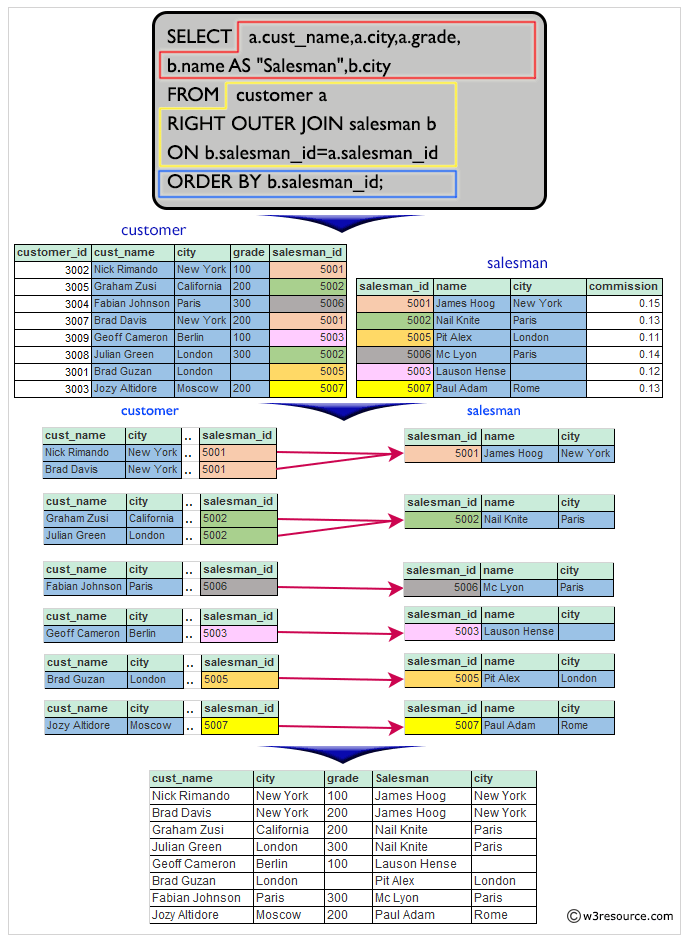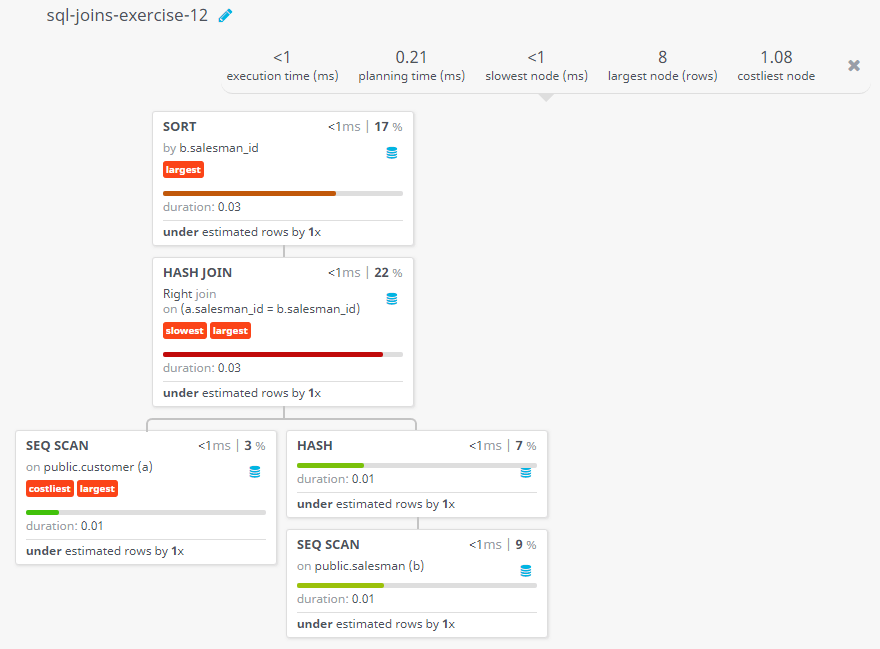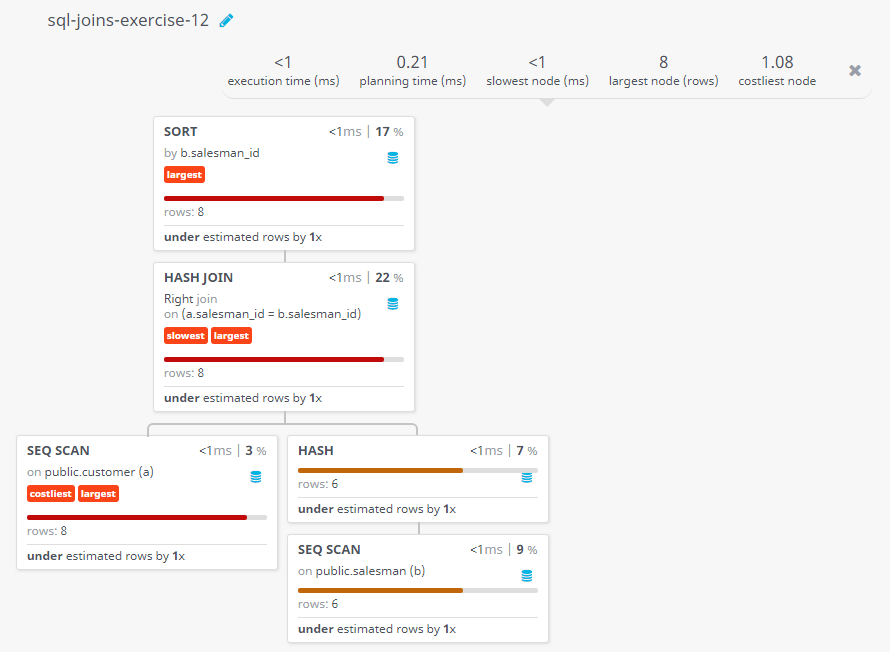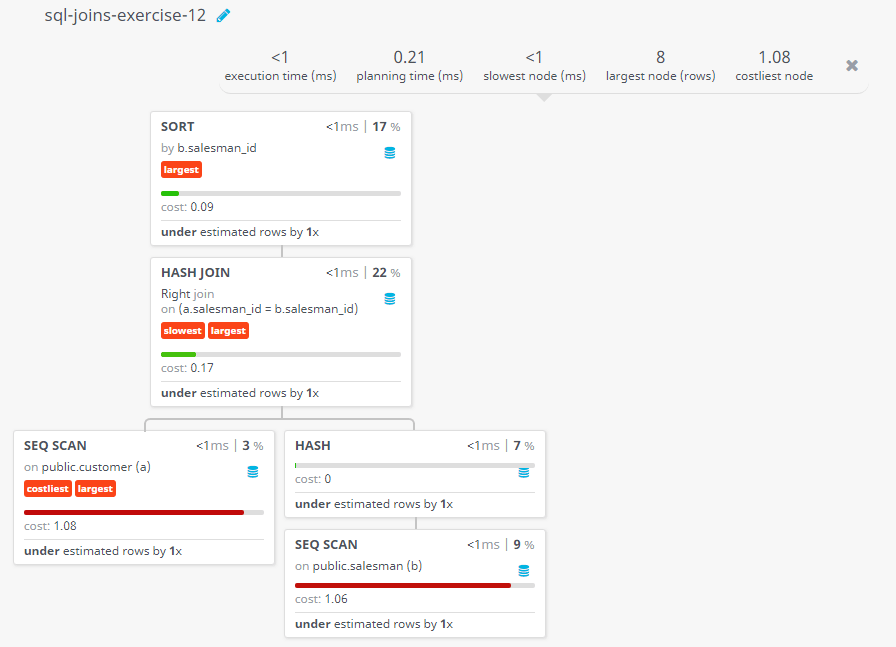SQL Exercise: Salesmen works either for one or more customer or not
12. Salespersons List (Including Unassigned)
Write a SQL statement to generate a list in ascending order of salespersons who work either for one or more customers or have not yet joined any of the customers.
Sample table: customer
customer_id | cust_name | city | grade | salesman_id
-------------+----------------+------------+-------+-------------
3002 | Nick Rimando | New York | 100 | 5001
3007 | Brad Davis | New York | 200 | 5001
3005 | Graham Zusi | California | 200 | 5002
3008 | Julian Green | London | 300 | 5002
3004 | Fabian Johnson | Paris | 300 | 5006
3009 | Geoff Cameron | Berlin | 100 | 5003
3003 | Jozy Altidor | Moscow | 200 | 5007
3001 | Brad Guzan | London | | 5005
Sample table: salesman
salesman_id | name | city | commission
-------------+------------+----------+------------
5001 | James Hoog | New York | 0.15
5002 | Nail Knite | Paris | 0.13
5005 | Pit Alex | London | 0.11
5006 | Mc Lyon | Paris | 0.14
5007 | Paul Adam | Rome | 0.13
5003 | Lauson Hen | San Jose | 0.12
Sample Solution:
-- Selecting specific columns and renaming them for clarity
SELECT a.cust_name, a.city, a.grade,
b.name AS "Salesman", b.city
-- Specifying the tables to retrieve data from ('customer' as 'a' and 'salesman' as 'b')
FROM customer a
-- Performing a right outer join based on the salesman_id, including unmatched rows from 'salesman'
RIGHT OUTER JOIN salesman b
ON b.salesman_id = a.salesman_id
-- Sorting the result set by salesman_id in ascending order
ORDER BY b.salesman_id;
Output of the Query:
cust_name city grade Salesman city Brad Davis New York 200 James Hoog New York Nick Rimando New York 100 James Hoog New York Graham Zusi California 200 Nail Knite Paris Julian Green London 300 Nail Knite Paris Geoff Cameron Berlin 100 Lauson Hen San Jose Brad Guzan London Pit Alex London Fabian Johnson Paris 300 Mc Lyon Paris Jozy Altidor Moscow 200 Paul Adam Rome
Explanation:
The said SQL query is performing a right outer join on the customer table alias a and the salesman table alias b on the 'salesman_id' column. It is then selecting the 'cust_name', 'city', and 'grade' columns from the customer table, and the 'name' and 'city' columns from the salesman table. The result is ordered by the 'salesman_id' column.
This query will select all the rows from the salesman table and any matching rows from the customer table and returning the results in the order of salesman_id. If there is no match, it will return NULL for the non-matching columns of customer table.
Visual Explanation:
Go to:
PREV : Order & Salesperson Report.
NEXT : Comprehensive Sales & Order Report.
Practice Online
Query Visualization:
Duration:
Rows:
Cost:
For more Practice: Solve these Related Problems:
- Write a SQL query to list all salespersons in ascending order, including those who have no customers assigned, by using a LEFT JOIN with the customer table.
- Write a SQL query to display salespersons along with a flag indicating if they are assigned to any customer, ordered by salesperson name.
- Write a SQL query to retrieve a list of salespersons showing those with associated customers and those without, sorted alphabetically by name.
- Write a SQL query to list salespersons with a computed column that indicates 'Assigned' or 'Unassigned', ordering the results by salesman_id.
Have another way to solve this solution? Contribute your code (and comments) through Disqus.
What is the difficulty level of this exercise?
Test your Programming skills with w3resource's quiz.




